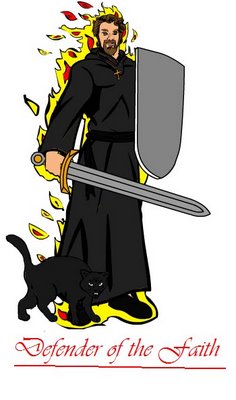27 August 2006 at Christ L.C., Chalmette, LA
Text: John 6:41-51 (1 Kings 19:4-8, Eph 4:30-5:2 (Three Year Series)
In the Name of + Jesus. Amen.
We are a people who are easily discouraged. It seems we drip with negativity, discouragement, and complaint. In little things and in big things, we lose heart and become depressed, embittered, and without hope for the future.
And this is nothing new.
The children of Israel, even as God was freeing them from 400 years of bondage and leading them to a promised land, grumbled against Moses. Even when God provided for all their needs of body and soul, even as manna literally rained down from heaven to nourish them, they complained because the menu didn’t provide enough variety for their tastes.
In today’s Old Testament lesson, Elijah becomes so negative about his work and his own sinfulness that he wishes for death. This man of God who worked miracles and heard the Word of the Lord spoken to him became despondent and depressed.
In our epistle lesson, Paul pleads with us not to grieve the Holy Spirit, and the first of a list of sins he cites is “bitterness.”
And finally, those people who listened to Jesus preach in his earthly ministry, they who saw him work miracles and perform healings, those who heard the promises of God from the lips of God himself respond by grumbling about him because they didn’t approve of what he said about himself.
And this is why we grumble. We have expectations, and God doesn’t meet them. Elijah had a certain level of success he expected in his ministry, and when he couldn’t see it, he counted himself a failure and demanded that God do things Elijah’s way, demanding that God give into Elijah’s depression. In our Gospel text, the people expected the Messiah to be something different, not one of them, not a human being who looked no different than any other person. Since God’s plan did not meet their preconceived idea, since God did not bow to their wishes, they grumbled.
Jesus picks right up on this. He tells them to stop it. He doesn’t mince words or coddle them. He orders them to knock it off. And further, he points out that they are no different than their ancestors who were so ungrateful to the Lord, who thought only of their bellies, who seemed to think it was their job to give Moses his orders, when in reality, that was God’s job.
Jesus further explains that unless they came to grips with the reality of who Jesus is, they would have no access to God the Father. He tells them that they don’t decide to follow him, but rather God draws them to his Son. Jesus tells them that he will raise them on the last day. He tells them that he is the teacher, and that they are being taught by God.
These are hard sayings that many of Jesus’ followers do not want to hear. This is not what they bargained for when they joined the church. They expected to maintain control, and to have some say about what the church teaches. They certainly didn’t expect to be talked to like this by some guy who grew up in Nazareth, whose mother wasn’t married and whose real Father is nowhere to be seen. And the nerve of this guy, talking about his Father as though his Father were God!
If this were not enough, Jesus compares himself to the manna from the Old Testament (the same thing his listeners’ ancestors grumbled about some 17 centuries earlier). He calls himself bread from heaven, living bread, and promises eternal life to anyone who eats this bread. He says his flesh is bread for the world to eat. In fact, in the next few verses after our lesson ends (which is next week’s gospel text), Jesus tells his listeners that in order to have eternal life, they must eat his flesh and drink his blood. His listeners will be shocked, and a third of them will abandon him.
But Jesus is not saying anything new. Holy Scripture proclaims that man doesn’t live by bread alone, but by every word that proceeds from the mouth of God. Yes, he needs bread, but he also needs the Word of God. Yes, he needs the Word of God, but he also needs bread. The Holy Sacrament is indeed both. It is the Word of God you can eat, and it is bread that you physically consume.
For we are both physical and spiritual creatures. When we fell into sin, our flesh became mortal and our spirits became impure. Both body and soul are corrupted. Both need medicine. The Lord Jesus came to be that medicine. Jesus comes to us to heal us in his Word. When the Holy Gospel is read, we stand at attention because Jesus is miraculously present in his Word, and we confess that the Word of God is powerful and does what it claims to do. And when that same Word of God is breathed out over bread and wine according to Christ’s institution, those physical elements literally and physically become Jesus. We not only hear our Lord, we touch him physically. His body becomes united to ours in this mystical meal. This bread is his flesh, and it is given for the life of the world.
And so, even though we grumble, the Lord gives us the remedy that we don’t deserve. The Bread of Life and the Word that proceeds from the Mouth of God is truly a miracle cure. A church father named Ignatius, who was a disciple of the Apostle John and the bishop of Antioch, called the Holy Supper “the medicine of immortality.”
Dear friends, we need medicine. We are sick in body and soul. Even the most faithful among us, those who serve the Lord faithfully for decades, will die in this mortal flesh. Not a single one of us is exempt from disappointments, from sickness, from natural disasters, from family problems, and from grumbling against God. Even the most faithful Christians, even those who take St. Paul’s exhortation to heart, the kind, compassionate, forgiving imitators of God, are sinful and in dire need of a Savior.
We need to eat this bread and drink this cup, and we need to do it, in the words of our Blessed Lord, “often.” The Lord’s Supper isn’t an add-on, it’s not just something that makes church longer, it’s not just a nice meal of unity that makes us think of Jesus. The Holy Supper is a very real physical miraculous cure, because it is the very real physical miraculous Jesus. If you eat this bread, my dear brothers and sisters in Christ, you will be strengthened in body and soul. You will have eternal life. Just as Elijah was told to eat miraculous bread to regain his strength, so you, dear Christian, will find supernatural strength in this supernatural Supper, this new manna that is given to you. You do not have to prepare this meal, you need no prescription for this medicine. If you cannot raise your arms to take it, the Lord, using his unworthy servant, will literally drop it in your mouth for you.
There are Christians, very sincere and devout Christians, who grumble still against Jesus. They, like those who leave Jesus in John 6, can’t accept his teaching that we are to eat his flesh and drink his blood for eternal life. They come up with all sorts of clever arguments about how when Jesus says “This is my Body,” he really means “This is not my body.” Some of these Christians will accuse us of bread-worship, of being idolators for calling this bread and wine “Jesus” and claiming it has the power of the Word of God.
But these grumblers have different expectations of Jesus. They want a Jesus who doesn’t come to them physically, but who only comes spiritually, whose body is safely millions of miles away, who no longer eats and drinks with sinners, who is only here with us “in spirit” like a well-intentioned parent who is too busy to attend a school function. But Jesus is almighty God. If he says he is bread, he is bread. If he says “This is my body,” then it is. And there is nothing more reliable in this world than when God says it is.
Over and against those who deny Jesus’ real presence in the sacrament, over and against those who see church as nothing more than learning how to be a good person, or worse yet, just another source of entertainment, we confess with Jesus and the church throughout history that Jesus is true bread from heaven, that his flesh is the bread that gives eternal life. We cling to this Holy Supper like the desperate and dying sinners that we are, knowing that this bread and wine, which are in fact, the true body and blood of Jesus, is the cure that brings us to everlasting life.
So, my brothers and sisters, if you want to be, in the words of Paul, imitators of God, if you wish to rid yourself of bitterness, rage, anger, brawling, slander, and malice, if you want to live forever, if you want to be a partaker of the resurrection of the body and the life everlasting, then you need the treatment, the therapy, the drug. You need to come to the hospital of the church where the medicine of immortality is given to those who grumble (but don’t want to), to those who grow weary of the godly life (and yet hunger and thirst for righteousness), to those whose bodies weaken day by day (and yet who desire to be restored to full health).
We are partakers of Christ in his Word and in the mystical feast. We are sons of God through the blood shed for us. We have eternal life through the Word of God, the Word we can eat, the Word of God whose flesh is the life of the world. This is most certainly true! Thanks be to God!
In the Name of the Father and of the + Son and of the Holy Spirit. Amen.
 I had the honor to lead the Divine Service today at the temporary sanctuary of Christ Lutheran Church in Chalmette. In two days, it will be one year since their building was devastated by Hurricane Katrina. They are still in the process of rebuilding - even as much of St. Bernard Parish (County) still lies in rubble.
I had the honor to lead the Divine Service today at the temporary sanctuary of Christ Lutheran Church in Chalmette. In two days, it will be one year since their building was devastated by Hurricane Katrina. They are still in the process of rebuilding - even as much of St. Bernard Parish (County) still lies in rubble.


